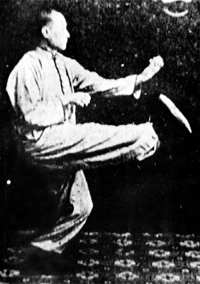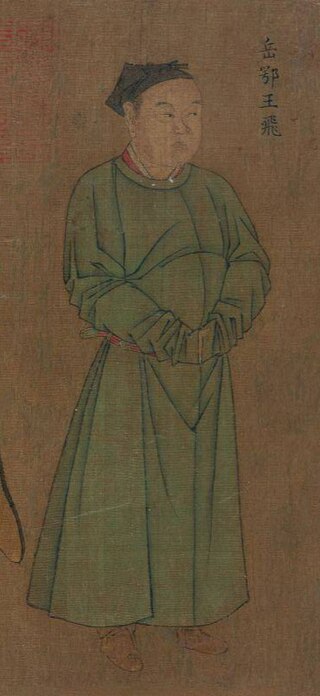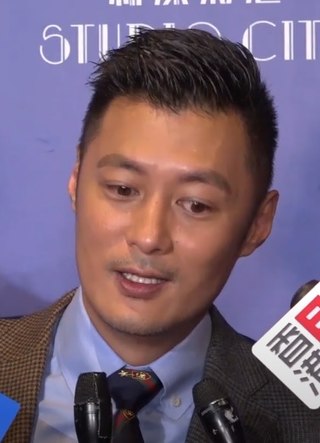Related Research Articles

Yue is a branch of the Sinitic languages primarily spoken in Southern China, particularly in the provinces of Guangdong and Guangxi.

Kwun Tong is an area in the Kwun Tong District of Hong Kong, situated at the eastern part of the Kowloon Peninsula, and its boundary stretches from Lion Rock in the north to Lei Yue Mun in the south, and from the winding paths of Kowloon Peak in the east to the north coast of the former Kai Tak Airport runway in the west.

Eagle Claw is a style of Chinese martial arts known for its gripping techniques, system of joint locks, takedowns, and pressure point strikes, which is representative of Chinese grappling known as Chin Na. The style is normally attributed to the famous patriotic Song dynasty General Yue Fei. Popular legends states that he learned martial arts from a Wudang Monk named Zhou Tong and later created Eagle Claw to help his armies combat the invading armies of the Jin dynasty. It was passed down until the Ming dynasty. Thus, the style took on long range strikes and aerial jumps. During the Qing dynasty, the military instructor Liu Shi Jun became known as the modern progenitor of Eagle Claw and taught many students. His student Liu Cheng You later taught Chen Zizheng who was invited to teach the style in the prestigious Chin Woo Athletic Association during the Republican era. The style spread as Chin Woo opened sister schools in other provinces. Today, it is practiced around the world.

Yue Fei, courtesy name Pengju (鵬舉), was a Chinese military general of the Song dynasty and is remembered as a patriotic national hero, known for leading its forces in the wars in the 12th century between Southern Song and the Jurchen-led Jin dynasty in northern China. Because of his warlike stance, he was put to death by the Southern Song government in 1142 under a frameup, after a negotiated peace was achieved with the Jin dynasty. Yue Fei is depicted in the Wu Shuang Pu by Jin Guliang.

The Baiyue, Hundred Yue, or simply Yue, were various ethnic groups who inhabited the regions of Southern China and Northern Vietnam during the 1st millennium BC and 1st millennium AD. They were known for their short hair, body tattoos, fine swords, and naval prowess.

Changquan refers to a family of external martial arts styles from northern China.

Goujian was the king of the Kingdom of Yue near the end of the Spring and Autumn period (春秋). He was the son of Marquis Yunchang.

Shawn Yue Man-lok is a Hong Kong actor and singer. A former model, he has starred in many films, such as Jiang Hu, Infernal Affairs II, the Love in the Buff film series, Mad World and The Brink, and has established himself as a recognisable face in Hong Kong cinema.
Yue He is a fictional character in Water Margin, one of the Four Great Classical Novels in Chinese literature. Nicknamed "Iron Whistle", he ranks 77th among the 108 Stars of Destiny and 41st among the 72 Earthly Fiends.
The Red Thread of Fate, also referred to as the Red Thread of Marriage, and other variants, is an East Asian belief originating from Chinese mythology. It is commonly thought of as an invisible red cord around the finger of those that are destined to meet one another in a certain situation as they are "their one true love".

Yue Man Square is the town centre of Kwun Tong in Kowloon of Hong Kong. It is also the commercial centre in the area.

Zhou Tong was the archery teacher and second military arts tutor of famous Song dynasty general Yue Fei. Originally a local hero from Henan, he was hired to continue Yue Fei's military training in archery after the boy had rapidly mastered spearplay under his first teacher. In addition to the future general, Zhou accepted other children as archery pupils. During his tutelage, Zhou taught the children all of his skills and even rewarded Yue with his two favorite bows because he was his best pupil. After Zhou's death, Yue would regularly visit his tomb twice a month and perform unorthodox sacrifices that far surpassed that done for even beloved tutors. Yue later taught what he had learned from Zhou to his soldiers and they were successful in battle.

The Swordsman, also known as Swordsman, is a 1990 Hong Kong wuxia film. King Hu was credited as the director but allegedly left the project midway, and the film was completed by a team led by producer Tsui Hark. The film is loosely adapted from Louis Cha's novel The Smiling, Proud Wanderer. The film was followed by two sequels: Swordsman II (1992) and The East Is Red (1993).
Zhou Tong, the archery teacher of Song dynasty General Yue Fei, has appeared in black-and-white films, wuxia novels, and folktales. He mainly appears in material dealing with Yue Fei, but also in media about his other students and his own biography and comic book.

Yue Lao is a god of marriage and love in Chinese mythology. He appears as an old man under the moon. Yue Lao appears at night and "unites with a silken cord all predestined couples, after which nothing can prevent their union." He is immortal and is said to live either in the moon or in the "obscure regions", the Chinese equivalent of Hades. His legends serve as the basis for the Red thread of fate.
Peng Yue, courtesy name Zhong, was a Chinese military general and politician in the late Qin dynasty and early Western Han dynasty. He was involved in the Chu–Han Contention – a power struggle between the Han dynasty's founder, Liu Bang, and his rival, Xiang Yu – as an ally of Liu Bang. In recognition of his contributions, Liu Bang granted Peng Yue the title "King of Liang" (梁王) after the Han dynasty was established.
Austin J. "Ozzie" Yue is a British actor and musician of Chinese heritage. On television, he appeared in Father Ted (1998), All Quiet on the Preston Front (1994–1997) and Harry (1995). His films include Lara Croft: Tomb Raider (2001), Syriana (2005), and Nuns on the Run (1990).

Sound of the Desert is a 2014 Chinese television series based on the historical romance novel Ballad of the Desert by Tong Hua. It stars Liu Shishi, Eddie Peng and Hu Ge. The series aired on Hunan TV from 1 October to 27 November 2014.
The Battle of Dartsedo was fought on January 28, 1701, between the Qing and Tibetan armies over the control of the strategic border town of Dartsedo.
Beautiful Duckling is a 1965 Taiwanese film directed by Li Hsing. It tells the story of a duck man Lin Tsai-tien and his adopted daughter Hsiao-yue. Hsiao-yue knows nothing about her real descent, which Lin has designedly disguised. Her natural brother Chao-fu is a Taiwanese opera actor, he keeps asking Lin for money. He brings Hsiao-yue to the theatrical troupe to follow himself, where Hsiao-yue learns about her natural parents. Lin has to sell all his ducks, entrust Hsiao-yue to Chao-fu, and gives him money to let him start his own business. At the end of the film, Lin's son comes back, and Chao-fu repents his behavior and returns the money to Lin.
References
- ↑ "Company Profile". Man Yue. Retrieved September 23, 2021.